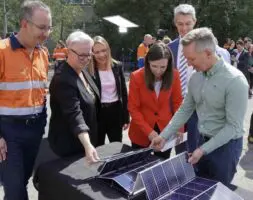Australia’s carbon markets have started 2022 by setting a new record for trade activity, with the highest monthly volume of carbon units changing hands, just as the price of European emissions permits approach their own major milestone.
According to carbon markets analysts Reputex, Australia set a new monthly record for the volume of Australian Carbon Credit Units (ACCUs) traded in January, reaching almost 550,000 across spot and forward markets.
Despite the record activity, Reputex said that prices of ACCUs had also started the year with a comparatively softer run compared to the rapid upward surge observed throughout last year, with spot prices tipping by 2.65 per cent during the previous two weeks to $54.50 per tonne.
The price of Australian offsets underwent a dramatic increase over the 2021 year, with spot prices more than doubling in value over the year.
Voluntary demand for ACCUs has surged due to growing interest from corporate buyers, and Reputex attributed the increase in prices to the entry of new participants in Australia’s voluntary carbon market.
Several corporate emitters have begun accumulating ACCUs to help meet their own commitments to zero net emissions targets and in anticipation of future government policies that may mandate companies cut emissions towards a national commitment to a net zero target.
Federal Labor has flagged that it may strengthen the existing Safeguard Mechanism should it form government after the next election, further increasing demand for ACCUs.
The Safeguard Mechanism imposes emissions caps on Australian industrial emitters, and includes an allowance for companies to use ACCUs to offset their emissions and stay under their cap. Should the caps be tightened, some emitters may opt to purchase ACCUs to stay under their caps.
But Reputex executive director Hugh Grossman said that a recent dip in ACCU prices, driven larger volume trades, suggested that some traders were taking an early opportunity to cash in on higher prices.
“While the recent bull run has been driven by smaller trades of around 5,000 units, the latest price declines have come on much larger parcel sizes – around 20,000 to 50,000 – suggesting that sellers have reached a happy level of price support in the mid-50s to service larger volumes,” Grossman said.
“Around 250,000 units have been transacted in the spot market over the last two weeks, suggesting that corporate buyers remain keen to lock in prices and build their pipeline of supply, while investors still consider the local market to be undervalued relative to more mature systems such as the EU ETS.”
The high prices have raised the prospect that some offset projects could seek to back out of contracts for the sale of ACCUs to the federal government – most of which were entered into when ACCU prices were around $15 per tonne.
As detailed by RenewEconomy, it may be possible for these projects to non-comply with their government projects and make a profit by selling ACCUs into the inflated spot market, even after contractual penalties are taken into account.
Reputex pointed to the similar surge in the prices of European emissions units, known as EU emission allowances (EUAs), which were approaching record levels of €100 per tonne (A$160), as tightening caps put pressure on companies to cut emissions.
The high prices being seen in the European scheme, Reputex said, could ultimately help drive investment in long-term emissions reduction measures. The EU emissions trading scheme was first launched in 2005 and is seen as one of the more “mature” carbon markets, having undergone several key reforms.
“EUA prices continue to be supported by that market’s more mature policy setting, including the EU’s target to reduce emissions by 55 per cent by 2030, the expectation of higher prices to support investment in technologies to meet net-zero, such as green hydrogen, and prices needed to incentivise fuel switching,” Grossman said.
“While the European carbon price has no direct impact on the local offset market, positive momentum may yet flow through to ACCU prices, particularly as volumes increase and new entrants look to replicate gains seen in the EU ETS.”









